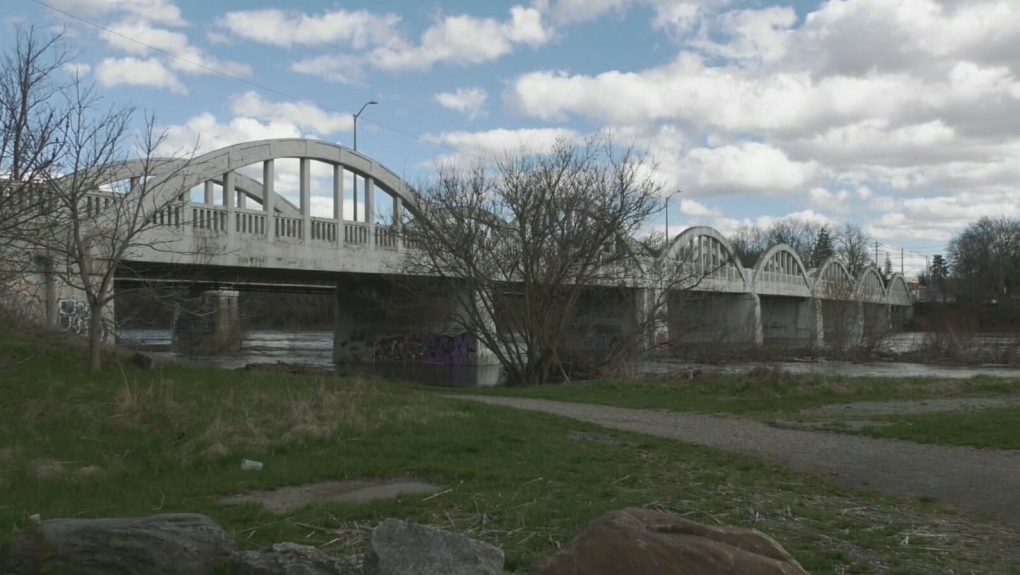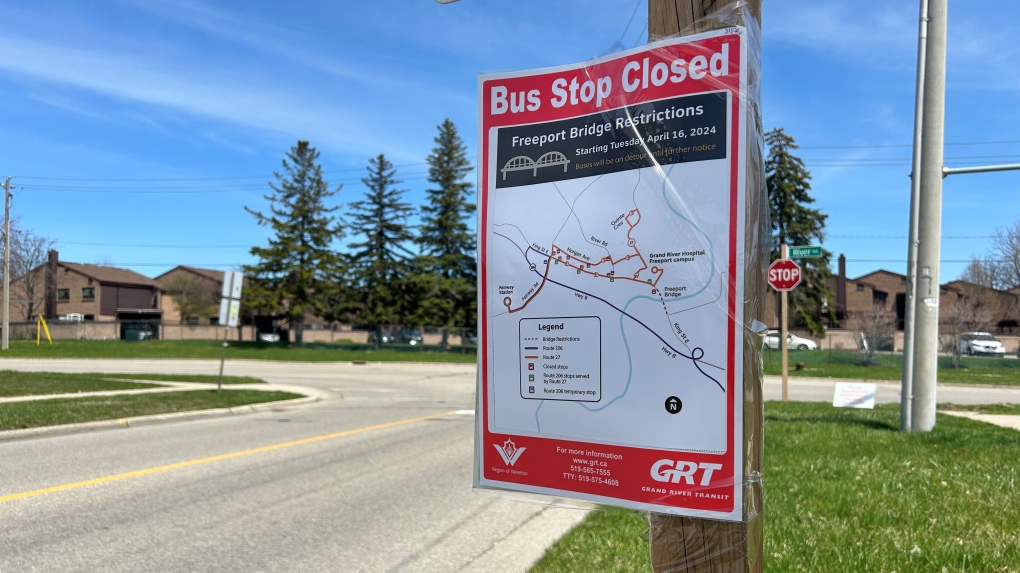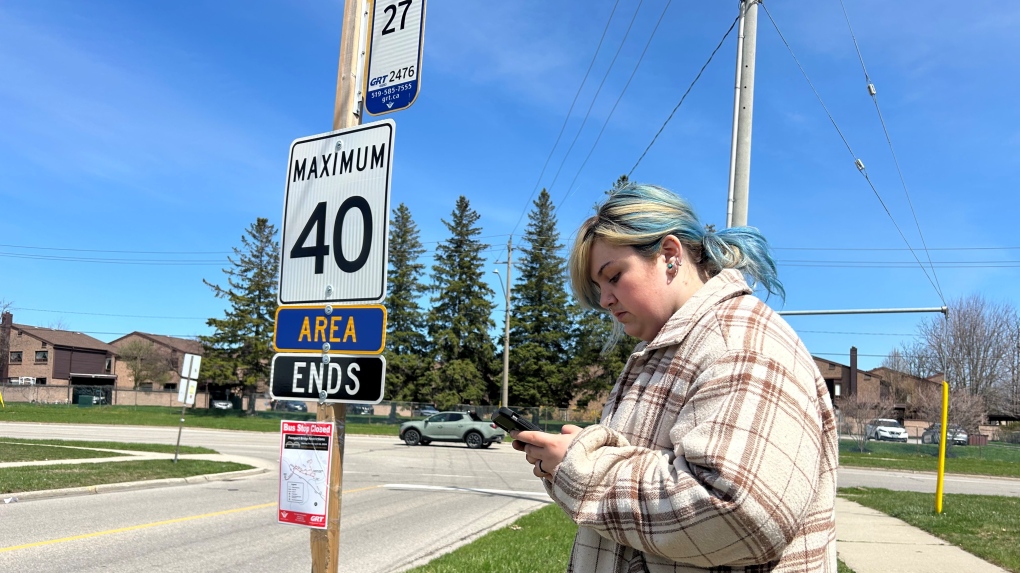Heavy vehicles, including buses, restricted on Freeport Bridge
Heavy vehicles, like firetrucks and Grand River Transit (GRT) buses, will not be allowed on Kitchener’s Freeport Bridge and it could remain that way until bridge rehabilitation work is complete.
The ban on heavy vehicles starts Tuesday.
The Region of Waterloo calls it a precautionary measure for bridge rehabilitation work that is set to start in 2025.
“We want to reassure everyone that the bridge is safe and we're just really trying to do this out of an overwhelming sense of precaution,” said Matthew Davis, director of transportation services with the Region of Waterloo.
 Freeport Bridge seen on April 15, 2024. (David Pettitt/CTV News)
Freeport Bridge seen on April 15, 2024. (David Pettitt/CTV News)
The bridge was built in 1926 and the region admitted it is starting to show its age.
“If you drove across it, you can see there are potholes and the outside of the concrete arches, you can see… it's been weathered and there's a little bit of a breakdown,” said Davis.
A detailed structural evaluation was recently done using computer software to model the effects of different vehicles and loads.
“The modelling for the Freeport Bridge showed that current heavy traffic loads may be causing tensile stresses in the concrete arches that were not designed to withstand these loads on a repetitive and long-term basis,” the region said in a news release.
 GRT buses are among the vehicles that are now not allowed on the Freeport Bridge. (Heather Senoran/CTV Kitchener)
GRT buses are among the vehicles that are now not allowed on the Freeport Bridge. (Heather Senoran/CTV Kitchener)
The region believes restricting heavier vehicles will help maintain the integrity of the bridge.
Crews will be installing monitoring equipment and performing live load testing to determine the next steps.
“There will be sensors on the bridge to figure out when a particular vehicle crosses the bridge, how the bridge responds,” said Davis.
How long the restrictions will last is dependant on the results of the testing.
“The testing piece will probably take about two months and we'll be able to understand better whether we need to leave the load restrictions in place until the rehab in 2025 or not,” Davis said.
Police will not be monitoring the bridge but the region said there will be traffic cameras at nearby intersections and staff will be looking to see if people are breaking the rules.
Other heavy vehicles that will be restricted include waste collection trucks and other heavy vehicles like fully loaded tractor-trailers, dump trucks and concrete trucks. The region said there are three school buses that usually take the Freeport Bridge but those buses will be taking alternate routes.
Vehicles that will still be allowed on the bridge include ambulances, MobilityPLUS vehicles, pickup trucks and light-duty delivery trucks.
GRT rider reacts
GRT riders will face detours that are listed here.
 Kitchener resident Neleh Braganca says detours as a result of the ban on heavy vehicles on the Freeport Bridge will mean longer commutes to visit her family. (Heather Senoran/CTV Kitchener)
Kitchener resident Neleh Braganca says detours as a result of the ban on heavy vehicles on the Freeport Bridge will mean longer commutes to visit her family. (Heather Senoran/CTV Kitchener)
Neleh Braganca, a Kitchener resident, said the restrictions mean a longer bus commute to visit her family, increasing her travel time by around 30 minutes.
“It’s actually really annoying,” she said, explaining the trip already takes up to an hour and a half without the detour.
Braganca called the restrictions a major inconvenience, especially when she travels with her younger sister often.
“She has special needs. It's harder for her to sit for those longer periods of time, and it's really going to affect her,” Braganca said.
The Freeport Bridge was restored once in 2003 for $3.5 million. It is unclear how much next year’s rehabilitation will cost.
CTVNews.ca Top Stories

BREAKING Celine Dion stages comeback with performance at Paris Olympics opening ceremony
Celine Dion staged the comeback of her career during the opening ceremony at the Olympic Games in Paris.
Paris Olympics kicks off with ambitious but rainy opening ceremony on the Seine River
Celebrating its reputation as a cradle of revolution, Paris kicked off its first Summer Olympics in a century on Friday with a rain-soaked, rule-breaking opening ceremony studded with stars and fantasy along the Seine River.
Jasper wildfire: 'Several weeks' before Jasper can return, premier says
Premier Danielle Smith said Friday afternoon in Hinton while weather conditions are cooler, the Jasper fire is still considered out of control and that Jasper residents can expect to be away from their homes "for several weeks."
Health Canada warns some naloxone kits contain false instructions
Health Canada is warning some take-home naloxone kits come with bad instructions that should be ignored in favour of the correct guidance.
'He was just gone': Police ramp up search for vulnerable 3-year-old boy in Mississauga, Ont.
Police in Mississauga are conducting a full-scale search of the city’s biggest park for a non-verbal toddler who went missing Thursday evening. Sgt. Jennifer Trimble told reporters Friday morning that there has been no trace of three-year-old Zaid Abdullah since 6:20 p.m., when he was last seen with his parents in Erindale Park, near Dundas Street West and Mississauga Road.
Driver charged after flashing high beams at approaching police
Orillia OPP arrested and charged a driver with impaired driving after flashing their high beams.
Irish museum pulls Sinead O'Connor waxwork after just one day due to backlash
An Irish museum will withdraw a waxwork of singer-songwriter Sinéad O’Connor just one day after installing it, following a backlash from her family and the public, it told CNN in a statement on Friday.
Turpel-Lafond won't sue CBC over Cree heritage report that took 'heavy toll': lawyer
The lawyer for a former judge whose claims to be Cree were questioned in a CBC investigation says his client is not considering legal action against the broadcaster after the Law Society of British Columbia this week backed her claims of Indigenous heritage.
Winnipeg senior's account overdrawn $146,000 for water bill
A Winnipeg senior is getting soaked with a six figure water bill.




























